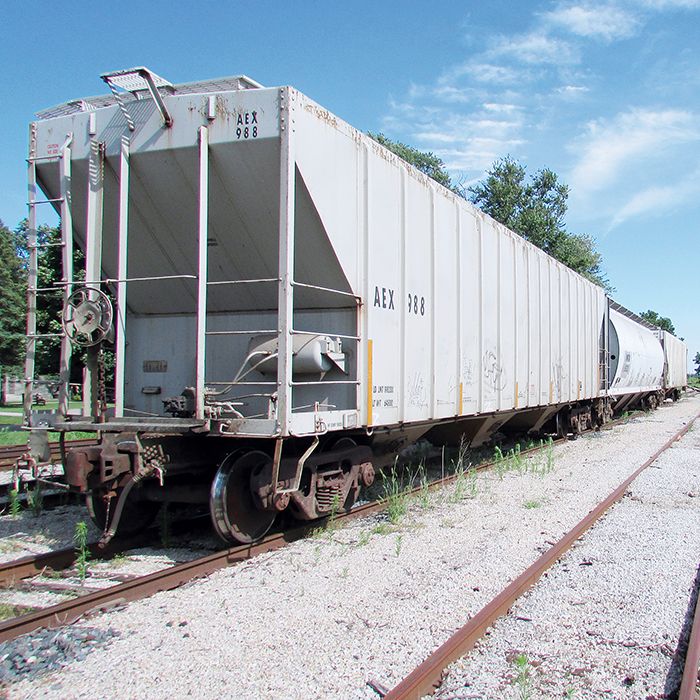Chatham-Kent’s farmers stand to lose the most if the municipality can’t find someone to operate the CSX line from Chatham to Wallaceburg.
The prediction comes from companies that use the line as an economical option to ship grain to some of their markets.
At a special meeting on Aug. 1, Chatham-Kent council voted to close the line when it takes it over on Oct. 3 and look for an operator before Canadian Pacific removes the track.
CSX is selling the 26-mile line for $4 million. CP will pay for $3.2 million of that to take ownership of the steel rails and wooden ties, which it plans to rip up if an operator of the line isn’t found.
The municipality is paying $800,000.
“Farmers in Chatham-Kent are going to lose a lot of money and opportunity if this rail line is closed down,” said Richard Smibert, president of London Agricultural Commodities (LAC), one of the active users of the rail line.
Smibert noted that LAC has significantly increased exports of grain from its Tupperville elevator on the line, which helps support the prices local farmers receive for their crops.
The line gives farmers access to three railways: CP, Canadian National and CSX.
Smibert said losing the link to the CSX railway is the big issue because it leads to key North American markets.
“CSX gives opportunities to go to feed mills and flour mills with grain in a very large geographical area,” added Smibert. “If the line closes, you go to a truck market that is much smaller and reduces grain prices to the local farmers.”
For example, corn from Tupperville moves by rail to major southern feed markets such as Georgia and Florida.
He predicts that closing the line would also have a large impact on truck traffic in the area.
“We’ve shipped 600 to 700 rail cars out of the elevator at Tupperville in the past year,” said Smibert. “That equates to 1,500 truckloads of grain that would be on the local roads. And there’s a cost to the local roads when that happens.”
Merle Hazzard, grain marketing manager at South West Ag Partners in Chatham, said the rail line has become particularly important in the last couple of years because the area has become a net exporter of corn.
“The other thing is the U.S. had a poor crop, and the fact that we all of sudden had extra corn, we could load and ship it to them, it was a great fit,” said Hazzard.
South West is another primary user of the line.
Should the line close, Hazzard said farmers would still be able to sell their grain but they’ll lose a competitive factor that supports their prices.
“When there is a competitive option in the marketplace, (buyers) have to make sure their bids are sharp or we can load the grain and ship it elsewhere,” said Hazzard.
Craig Jackson, co-owner of Jackson Seed Service Ltd. in Dresden, said the line is an important shipping route to the U.S. and a better option than trucking.
“At the end of the day, (trucking) is not as an efficient access to our markets; it cuts into our margin, which eventually cuts into the farmers’ share,” said Jackson.
Echoing Hazzard’s comments, Jackson noted that the rail option offers another market for grain farmers.
“I know people say there are lots of markets here for corn and wheat, but it provides competition for those guys and increases the prices for everybody. It keeps them honest,” said Jackson.
Meanwhile, the uncertainty of the situation is already having an impact.
LAC is holding off on plans to expand the Tupperville elevator.
“We can‘t make grain sales past Oct 3 or make future plans because we don’t know if the rail line is going to be open or not,” said Smibert.
As for the next steps, Stuart McFadden, deputy director of economic development for the municipality, said work is under way to complete the transaction by Oct. 3 and to follow council’s other direction of finding an operator at little or no cost to the municipality.
“It was never our intention to operate a rail line,” noted McFadden. “That’s a business that requires expertise that we don’t have internally. All we’re trying to do is broker a deal that will keep it viable.”
The municipality has been seeking a solution since 2006 when CSX announced it was shutting down the tracks.
If C-K didn’t get involved at that point to indicate an intention to buy the line for its net salvage value, the rail line would have been ripped up in 2007.
“It was important to them to understand that we have to follow through with the acquisition that was agreed to,” said McFadden of his discussions with the rail line users. “But right now, we don’t have an operation solution.”







